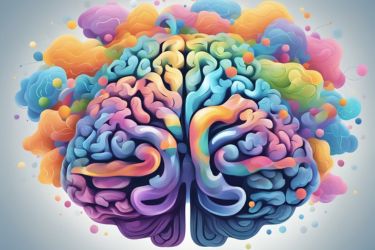In today's world, we often measure intelligence through traditional IQ tests, focusing on logical reasoning and problem-solving skills. Yet, emotional intelligence (EQ) plays a crucial role in our lives, often proving to be more important than IQ in achieving success and happiness. By understanding and managing our own emotions and recognising the feelings of others, we improve our relationships and decision-making capabilities.

Emotional intelligence allows us to navigate social complexities with ease, making us more self-aware and empathetic. Studies suggest that individuals with high EQ tend to excel in their personal and professional lives. This vital skill set enables us to build stronger connections and create a positive impact on those around us.
As we explore the differences between EQ and IQ in this article, we will uncover the reasons why emotional intelligence is essential for thriving in the modern world. By the end, we’ll see how fostering our emotional skills can lead to not only personal growth but also greater success in our careers and relationships.
The Concept of Emotional Intelligence

Emotional intelligence, or EQ, is often seen as a key factor in personal and professional success. We will explore what emotional intelligence means and how it contrasts with traditional intelligence, known as IQ.
Defining Emotional Intelligence and Its Components
Emotional intelligence is the ability to recognise, understand, and manage our own emotions, as well as to recognise and influence the emotions of others. It consists of five main components:
-
Self-awareness: This is the ability to understand our own emotions. It helps us recognise how we feel, and how those feelings can affect our thoughts and behaviour.
-
Self-management: This involves controlling our emotions and adapting to various situations. It allows us to stay calm under pressure and respond thoughtfully rather than react impulsively.
-
Social awareness: This is the ability to empathise with others and understand their emotional cues. It's crucial for building strong relationships and navigating social networks.
-
Relationship management: This includes managing interactions with others effectively. Good relationship management leads to better communication, conflict resolution, and teamwork.
-
Motivation: This refers to our ability to harness emotions to achieve goals. A strong intrinsic motivation helps us to stay committed and focused.
Differences Between EQ and IQ
While IQ, or intelligence quotient, measures cognitive abilities and academic skills, EQ focuses on emotional and social skills. Here are some key differences:
-
Focus: IQ assesses logical reasoning and problem-solving. EQ examines emotional understanding and empathy.
-
Development: IQ is often seen as fixed, while EQ can be developed over time with practice and self-reflection.
-
** Impact**: High EQ can lead to better leadership, teamwork, and personal relationships. In contrast, a high IQ often correlates with academic success but does not predict emotional or social effectiveness.
In summary, while IQ measures intellectual capabilities, EQ provides insights into how we manage our emotions and relate to those around us. Understanding both forms of intelligence is essential for personal growth and success.
The Role of Emotional Intelligence in Success

Emotional intelligence (EQ) plays a crucial role in determining our success, especially in the workplace. While high IQ may help with technical skills, EQ enhances our ability to interact with others and manage our emotions effectively.
Emotional Intelligence and Professional Success
In our professional lives, high emotional intelligence allows us to build strong relationships and harmonise with colleagues. Individuals with a high EQ are better at understanding their own feelings and the feelings of others. This self-awareness promotes effective communication and teamwork.
Those with high EQ often excel in leadership roles. They handle stress and conflict more effectively, which creates a positive work environment. For instance, they can encourage collaboration and motivate teams, leading to improved productivity and job satisfaction among peers.
Comparing EQ and High IQ in Achieving Success
While high IQ indicates strong cognitive abilities, it does not guarantee success. Research shows that emotional intelligence accounts for about 80% of our success in life. This suggests that EQ can be more significant than IQ in various situations.
People with high IQs may struggle with emotional interactions. In contrast, those with high EQs can navigate social complexities with ease. They can adapt to changing environments, which is vital in today’s fast-paced world. In summary, both IQ and EQ matter, but emotional intelligence often plays a more significant role in achieving ongoing success.
Emotional Intelligence in Leadership and Teamwork

Emotional intelligence plays a critical role in how we lead and collaborate within teams. It enables leaders to connect more deeply with their team members while fostering a positive work environment that enhances teamwork.
Characteristics of a Successful Leader
A successful leader displays several key emotional intelligence traits. Firstly, self-awareness allows leaders to recognise their emotions and understand how these affect their decisions. This awareness helps us to remain grounded and receptive.
Secondly, empathy is vital. A leader who can understand others' feelings fosters trust and promotes open communication. This can lead to stronger relationships within our teams.
Lastly, self-regulation helps us manage emotions effectively, especially during stressful situations. This ability to remain calm encourages our team to stay focused. Leaders who embrace these qualities create a supportive atmosphere that encourages collaboration and boosts morale.
Building Effective Teams Through Emotional Intelligence
Building effective teams requires attention to emotional intelligence. We can start by promoting open communication. When team members feel safe sharing their thoughts, it enhances collaboration.
Next, we should recognise and celebrate individual strengths. This helps each member feel valued and boosts their confidence. Acknowledging accomplishments can foster a sense of belonging and encourage everyone to contribute.
Additionally, we must cultivate conflict resolution skills. Leaders with high emotional intelligence can mediate disputes effectively. This ensures that conflicts are addressed promptly and respectfully, preventing disruption.
By prioritising these aspects, we can create cohesive teams that work well together and achieve our goals.
Improving Communication and Relationships with High Emotional Intelligence

High emotional intelligence (EQ) enhances our ability to communicate effectively and build strong relationships. By developing skills like empathy and social awareness, we can foster better interactions both personally and professionally.
Empathy and Social Skills in Interpersonal Communication
Empathy plays a vital role in our communication. It allows us to understand and share the feelings of others. When we listen actively and respond thoughtfully, we show that we care. This approach helps us build trust.
Social skills, such as clarity in our speech and body language, improve our interactions. We can use specific techniques, like maintaining eye contact and nodding, to show we are engaged. These simple actions signal to others that we value their input.
In teams, high EQ helps us navigate conflicts and misunderstandings. We encourage open dialogue, leading to stronger relationships and better teamwork.
Emotional Intelligence in Understanding and Meeting Customer Needs
In a business setting, high emotional intelligence helps us connect with customers on a deeper level. We can identify their emotions and needs through attentive listening and observation.
By understanding what drives our customers, we can tailor our communication. This personal touch often results in stronger relationships. For example, if a customer feels frustrated, acknowledging their feelings can turn a negative experience into a positive one.
Effective communication with customers also involves asking the right questions. By doing so, we gain deeper insights into their preferences. This information helps us provide solutions that meet their unique needs and build loyalty.
Application of Emotional Intelligence in Personal and Professional Development
Emotional intelligence (EQ) plays a vital role in both our personal and professional growth. By applying EQ, we can enhance our productivity, improve problem-solving abilities, and develop essential soft skills.
Enhancing Productivity and Problem-solving
In our daily tasks, emotional intelligence helps us recognise our own emotions and those of others. This awareness allows us to remain calm under pressure, making it easier to solve problems.
For example, when facing a challenge, we can analyse the situation more clearly and collaborate with our team. By understanding differing perspectives, we can create better solutions faster. This boost in productivity not only helps us reach our goals but also promotes a supportive work environment.
Emotional Intelligence Training and Development Programs
Instituting training programs focused on emotional intelligence can greatly benefit us. These programmes teach skills such as self-regulation, empathy, and effective communication.
Through role-playing scenarios and workshops, we learn to manage stress and resolve conflicts more effectively. Companies that adopt these programmes often see improved teamwork and higher job satisfaction among employees.
Practicing these skills helps us grow both personally and professionally, preparing us for future challenges.
Utilising EQ for Entrepreneurship and Soft Skills
For entrepreneurs, emotional intelligence is essential. It helps us connect with customers, employees, and investors. By understanding emotions in business settings, we can build stronger relationships and create loyal networks.
Moreover, EQ enhances our soft skills, such as teamwork, adaptability, and communication. These soft skills are increasingly important in today’s diverse workplaces.
By honing our emotional intelligence, we navigate the complexities of the business world more effectively. This, in turn, can lead to greater success and profit in our ventures.





















